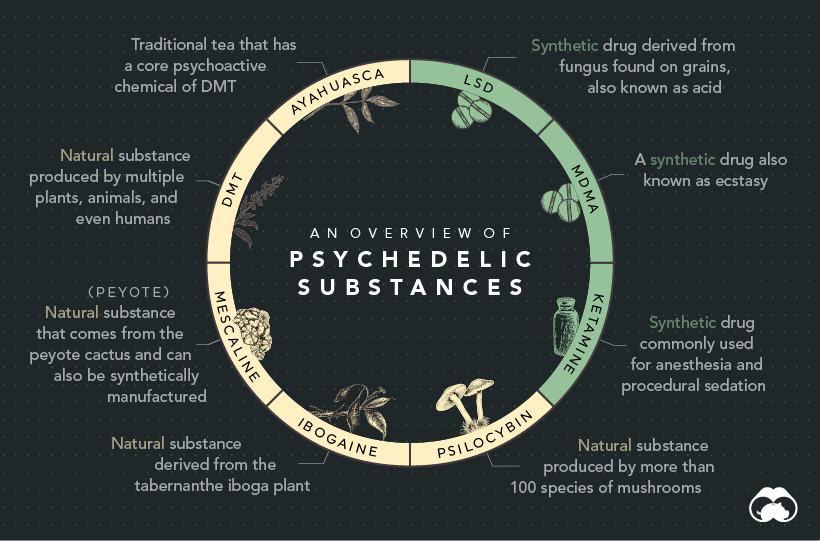the world of psychedelics
DISCLAIMER: i am not a medical professional nor do i recommend/encourage the use of any illegal substances
what are psychedelics?
psychedelics, as described by the National Institutes of Health,"are powerful psychoactive substances that alter perception and mood and affect numerous cognitive processes". A single psychedelic experience has been known to change one's perception of not just the world around them but also one's sense of self. there is a certain connection between psychology and biology that is not fully understood. in plain words, they are a unique type of drug that induce feelings of euphoria and are known to cause hallucinations, as well as other side effects. most common types include LSD (acid), psilosybin (magic mushrooms), and in some cases marijuana (weed).

a brief history
the true origins of psychedelics and mankind's relationship with them transcends written history. However, scientists and historians do have their theories. Some linguists suggest that psilosybin mushrooms may have played a major role in the development of language. It is very likely that as prehistoric human ancestors tracked their prey, they came across magic mushrooms. when ingested, some people report expeirencing symptoms of synesthesia - a crossing in the brain that allows for the association of multiple senses, such as hearing colors or tasting sound. It is theorized that these prehistoric humans developed a specific type of synesthesia which allowed for sound association with meaning; because that's all that language really is, connecting a sound with its meaning.
or, relatively more recently, psychedelics were commonly used for religious purposes. For example, ancient Mayan and Aztec preist would consume some type of native hallucinogenic. they would do this before rituals in order to better atain enlightment and be closer to the realm of gods. It is also theorized that Christian priest would burn a mixture of sage and possible marijauna or salvia during receptions.
research into psychedelics began around the 1930s/40s. Swiss chemist Albert Hoffman first synthesized lysergic acid diethylamide (LSD-25) in 1938. He had been researching the possible medicinal uses of ergot (the plant which LSD is derived from) and decided to test it for himself, accidently dosing himself with a large amount of LSD. In one of the articles cited below, Richard E. Doblin - Executive Director of Multidisciplinary Association for Psychedelic Studies - states "Throughout the 1970s and '80s governmental interventions severely hampered global psychedelic research, despite evidence of the limited medical risks and therapeutic potential of psychedelics".
legality debate
psychedelics are still considered a schedual 1 drug, meaning it is illegal to consume, produce, or distribute or possess psychedlics in the US. However, research around the world suggests that psychedlics could be used for theraputic purposes, such as for patients with PTSD, Depression, and a range of mental illnesses. This has prompted much debate over whether or not these mysterious drugs should be legal or not; and if so, how far? the simple fact is that scientists still don't fully understand the potential risk of psychedelics, though there is still hope for the future.
mushrooms
...
lsd
...
tripping
i would like to clarify that by no means am i encouraging the use of illegal substances, especially underage, and am only informing people of safety measures they should take
that being said, people are going to do drugs no matter what, so here are some precautions you can take to ensure the safety of yourself and others
- buy from a trusted source. dont get your drugs from any old shmuck on the street. make sure who ever you're getting it from knows what they're doing (dosages, clean and seperate packaging, etc) if youre dealer sells other - worse - stuff, thats how you get laced; crossed contamination via lazy or sloppy dealers. find someone you can trust before buying.
- dont go alone. especially your first time tripping, grab a friend or two to keep you company. or, if things go wrong, someone to have your back
- go slow. if youre not entirely sure of the dosage or your tolerance, its best to take things slow. you'd rather be bored than terrified.
- stay in a safe environment. either yours or a trusted friend's house. and for your first time its best to stay there. you can have more fun staring at a wall than getting lost in the woods or running through traffic or something
- go with the flow. take your time and enjoy the expeirence. god forbid it goes wrong, stay calm and remember it will end.... eventually.
- clear your calender. psychedelic trips can last hours. its best to set at least a day aside to give yourself time to recover and readjust
EGO DEATH
...